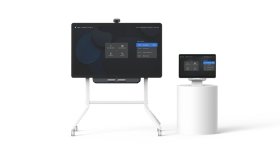
Evrymmnt - stock.adobe.com
Google pushes Meet features for hybrid work challenges
Google lags rivals Cisco, Microsoft and Zoom in addressing the needs of a hybrid workplace, analysts said. The latest catch-up features are in Google Meet.
Google's upcoming Meet features tackle the challenges faced by companies that plan to let employees split their workweek between home and the office. The improvements represent the company's latest attempt to catch up with competitors Zoom, Cisco and Microsoft.
This week, at its Google Cloud Next conference, Google discussed hybrid work practices at a time when companies are struggling to figure out what a return to the office will look like. When offices reopen, companies fear a gap will form between workers in the office and those at home.
"The single greatest worry right now is … that there is no unified culture or effective collaboration between these two groups," said Constellation Research analyst Dion Hinchcliffe.
Google said an upcoming companion mode for Meet video conferences would address this divide. The mode allows conference-room attendees to join meetings in a limited capacity using their laptops. While the meeting's video feeds play on the room's monitor, employees can see the chatroom, participate in polls, and turn on captions from their devices.
Google offers the companion mode for companies that want employees to participate in meetings like remote workers while not taking up additional office bandwidth by streaming video. Google executives said the feature will roll out soon.
Microsoft has a similar companion mode for Teams Rooms. It will allow in-person workers to use their mobile devices to access chat later this year. Zoom Rooms users can respond to chat messages today using a touchscreen device or the room controller.
Cisco, Microsoft and Zoom have addressed another side of the equity problem: They've announcing features to individually frame conference room attendees so remote workers don't miss body language and facial expressions. Google does not have the capability.
Matching capabilities competitors already have is a recurring problem for Google. Gartner ranked Google behind market leaders Zoom, Cisco and Microsoft in its recent video meetings Magic Quadrant. The analyst firm noted that companies often need to supplement Meet with other video-conferencing products with more features and integrations.

"Google is playing catch-up with the leading players in the video meetings market who have innovated at a faster pace," said Gartner analyst Mike Fasciani.
A trend already addressed by rivals is hot desking, the practice of having multiple employees share the same desk in office designs for a hybrid workforce. Google product manager Jennifer Shen said Meet would incorporate a Google Calendar feature that lets employees indicate whether they're working from home or the office.
"[The calendar feature was] really useful in helping me coordinate a few in-person meetings and lunches with my teammates, who were also on campus when I was," Shen said at a Next conference session.
Google hardware partner Avocor has tailored its upcoming Google Meet Series One Desk 27 device for hot desking. The Desk 27, coming later this year, is a 27-inch touchscreen display that also serves as a laptop docking station for multiple workers. It will sell for $1,999.
Google's competition has already announced hot desking features and hardware. This year, products headed to tech buyers include Microsoft Teams displays, Cisco Webex Desk devices and Zoom Rooms hardware.
Hinchcliffe said Google must continue adding features to Meet to keep its Workspace productivity suite competitive. Customers that don't have a capable video conferencing app in Workspace will look to competitors like Microsoft for an all-in-one product.
Mike Gleason is a reporter covering unified communications and collaboration tools. He previously covered communities in the MetroWest region of Massachusetts for the Milford Daily News, Walpole Times, Sharon Advocate and Medfield Press. He has also worked for newspapers in central Massachusetts and southwestern Vermont and served as a local editor for Patch. He can be found on Twitter at @MGleason_TT.






